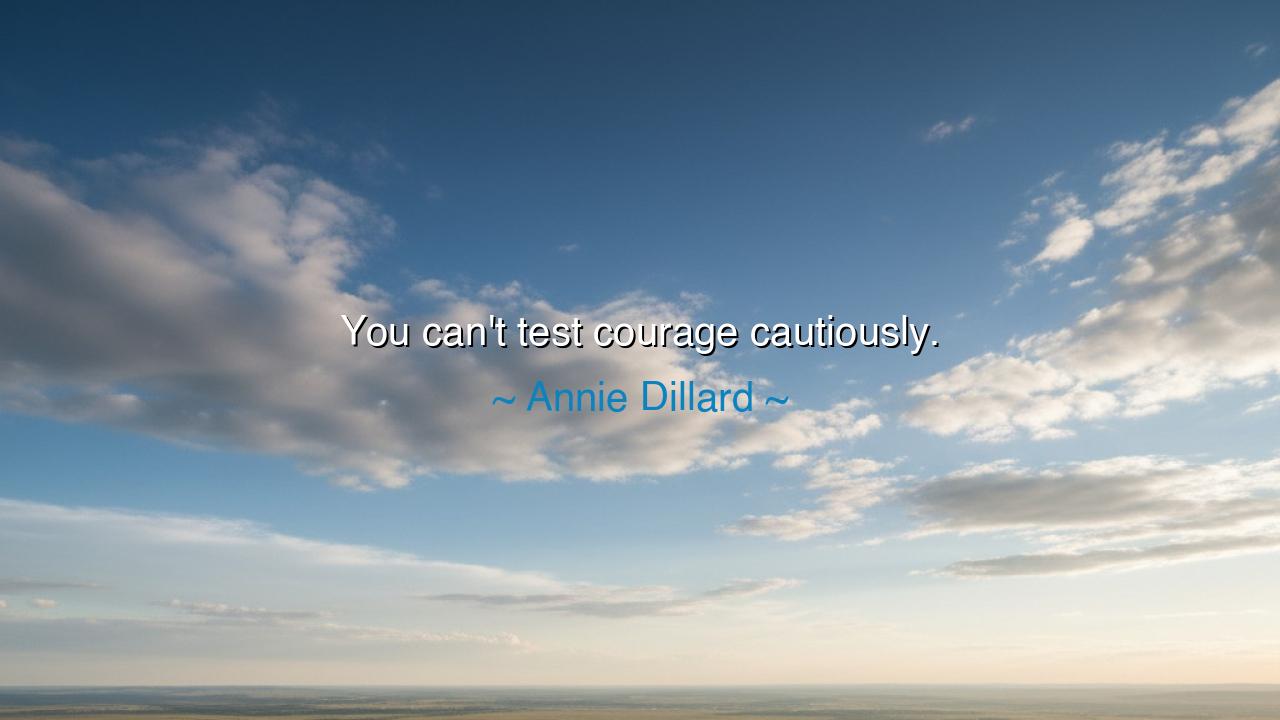
You can't test courage cautiously.






In the fierce and luminous words of Annie Dillard, the mystic of observation and the poet of life’s raw edge, we hear a truth that stirs the blood: “You can’t test courage cautiously.” These words strike like the sound of a blade drawn from its sheath — sharp, undeniable, and alive with challenge. For what is courage, if not the leap into uncertainty? What is valor, if not the act of standing in the storm rather than watching from the shore? Dillard reminds us that the measure of courage is not taken in safety or comfort. It is forged only in the fire of risk. The one who seeks to test courage without danger, to prove bravery without stepping into the unknown, will find nothing but shadows of what might have been.
Annie Dillard, a Pulitzer Prize–winning author and seeker of truth, lived her life in constant awe of the world’s mystery and danger. Her works — from Pilgrim at Tinker Creek to Teaching a Stone to Talk — reveal a mind that saw divinity in both beauty and peril. This quote arises from her reflection on the human condition: that courage is not a theory, but an act; not a concept, but a crucible. It is easy to speak of bravery when the ground is steady beneath one’s feet, but true courage demands the trembling step onto the uncertain path. As the ancients said, “Fortune favors the bold” — but only because the bold have first dared to face her wrath.
To test courage, then, is to surrender control. It is to move without guarantee, to act without promise of victory. The cautious heart, seeking to protect itself from pain or failure, will never taste the sweetness of transcendence. It is like the sailor who longs for the horizon but refuses to leave the harbor; the ship, untouched by waves, remains safe — but it was never built to rest in still waters. So too are we made not for caution alone, but for daring — for those moments when we stand trembling before the vast unknown and take the step anyway.
History offers us countless souls who lived these words with every breath. Think of Rosa Parks, who one day refused to give up her seat on a bus, not knowing if she would be beaten, arrested, or forgotten. Her act was not cautious; it was courage incarnate. Or consider Neil Armstrong, who stepped into the void of space, not with certainty, but with faith — faith in his training, his team, and the indomitable human spirit. In each of these stories, courage was not tested in safety, but in the face of danger, doubt, and potential ruin. Such moments reveal what Dillard meant: that true courage cannot be measured with half-measures; it must be lived at full risk.
In the writings of the ancients, courage was considered the foundation of all virtue. Aristotle declared it the first of virtues, for without it, none of the others could be practiced. Compassion requires the courage to open one’s heart; justice, the courage to stand against wrong; truth, the courage to speak though the world would silence you. Dillard’s words, though modern, carry the same flame. She reminds us that we cannot know ourselves by hiding from the trials that define us. Courage, like muscle, grows only through strain. The one who seeks to test it gently, who wishes to know their strength without ever facing their fear, will remain forever unproven.
But courage is not recklessness. Dillard does not glorify blind danger or foolish risk. Rather, she speaks of the sacred balance — the willingness to act though the outcome is unknown, to trust one’s inner strength though it quivers. Courage is not the absence of fear; it is the mastery of it. It is the whisper that says, “Go forward,” even as your heart trembles. To live fully is to accept that some steps will lead into the dark — yet only by taking them can you find the light beyond.
And so, dear listener, take this wisdom as a call to life: when the moment comes to act, do not seek to test courage cautiously. There is no safe way to be brave. Speak your truth, even if your voice shakes. Pursue your dream, even if the world doubts you. Love deeply, even if loss waits at the end. Every act of courage expands the soul; every act of hesitation feeds the chains of fear. Life will always demand a price — but pay it willingly, for in that payment lies freedom.
Let Annie Dillard’s words echo through your heart: that courage cannot be tested behind walls or measured in comfort. It must be lived in the open, beneath the vast and uncertain sky. The one who dares to step into the unknown — trembling yet unbroken — becomes not merely brave, but fully alive. For it is in daring, not in safety, that the spirit discovers its wings.






AAdministratorAdministrator
Welcome, honored guests. Please leave a comment, we will respond soon